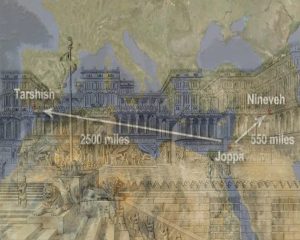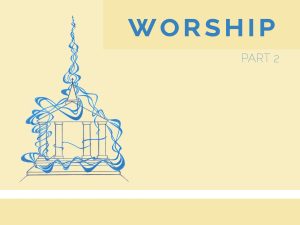
Jonah Chapter 2
Have you ever been in a hopeless situation? A time when you were in a place in life where there was no human way for you to get relief or find a way out of the situation?
Jonah was in a desperate situation. He had hoped to die, because his prejudice towards the Assyrian people in Nineveh was so great the he would rather die than preach God’s word to them. I think that in Jonah’s mind, there was a sense of relief when they threw him overboard, now it was over, there was no more tension between being obedient to the Lord or not. But, God was not done with Jonah.
The Lord provided a large sea creature and commanded the fish to swallow Jonah. God is sovereign over all of creation, He made it and he controls it.
This was not a “plan B” by God. Jonah, as we saw last week was a prophetic picture of Jesus, that Jesus used to rebuke the Pharisees who were asking for a sign from Jesus to convince them that he was the Messiah (Matthew 12:40).
Jonah finds himself in the belly of a large sea creature, feeling the digestive acids beginning to eat at his skin, in the pitch dark he remembers the Lord. In the first chapter, Jonah does not pray or address the Lord at all, rather the sailors cry out to God and are saved. But now, Jonah realizes that this is no ordinary fish, God has his attention and he is beginning to re-evaluate his priorities.
God is disciplining Jonah. Just as God is sovereign over all of creation, so too he has the right to discipline and correct his children (see Proverbs 3:11-12). When God disciplines us, it isn’t evidence of his lack of care, it is proof of His love for us.
Jonah begins to repent and recognizes the hand of God in his situation. As we read Jonah’s prayer we see glimpses of hope, he begins to take his focus off the situation he finds himself in and begins to hope in God (Jonah 2:4 &6).
Notice the second part of verse 6. “But you Lord my God, brought my life up from the pit” Jonah realized that he did nothing to deserve his salvation, he realized that he was at the mercy of God and that he had nothing in himself that was good. His salvation was only by the Grace of God. If we ever think that we are saved because of our good life, how much money we have given to the church, how many people we have helped, even how many people we have told about Jesus – we are horribly mistaken. We are saved by Grace alone through Christ alone, Jonah understood this.
In verse 8 it seems that Jonah changes his line of thinking, as he goes from repentance and remorse to condemning people who worship idols. But I think Jonah understood that an idol is not necessarily a block of wood or stone carved into a shape. But rather an idol is anything that takes the place of the pre-eminence of God in one’s life. Jonah realized that his idol was his own patriotism and his own self-righteous prejudice against the people of Nineveh. He realized that his idol had turned him away from God’s love for him.
Anytime we have anything in our own lives that takes the place of God, that is more important to us than God, it is an idol and because of that idol we turn away from God’s love for us, and we miss out on the best that God has for us. An Idol may be the love of money, or a relationship that you know is not right for you, or maybe the love of your own comfort, the list could go on. These things are examples of idols in our lives.
As Jonah repents, he begins to realize his position with God, he begins to rejoice in his love for the Lord (Jonah 2:9). Remember that he is still in the belly of the whale. Jonah’s position has not changed, but his heart has changed. He begins to worship the Lord and praise the Lord in his darkest hour, literally – I don’t think the large fish had any internal lighting.
What we see here is the offering of a sacrifice of praise. The Psalmists often speak of offering a sacrifice of praise to God, and Hebrews 13:15 says, “Through Jesus, therefore, let us continually offer to God a sacrifice of praise—the fruit of lips that openly profess his name.”
When we praise God, it pleases Him, our singing and praise is an offering to God.
When you are going through the tough times in life, the loss of a loved one, or financial struggles, your marriage is in a difficult place; when you are going through those tough times, that is when it is the hardest to stand up and sing praises to God. That is the sacrifice of praise, it is white knuckle praise. Praising God in the midst of your darkest hour because even though you don’t see it now, he is faithful and he will always remain true to his promises.
Those are the praises that please God. The same writer to the Hebrews writes in Hebrews 11:6, “without faith it is impossible to please God.”
When you are going through tough times, that is when it takes faith to praise and sing to God, that is a sacrifice of praise that pleases God.
Jonah repents and rededicates himself to his ministry (Verse 9). As we read further in the book of Jonah, he becomes one of the most successful evangelists in the Bible. Talk about a turnaround. Being in the digestive juices of a whale will do that to you.
The Lord knew Jonah’s heart and knew that Jonah’s repentance was genuine, and commands the fish to spit him out on the shore.
What are you struggling with? It doesn’t matter what we are struggling with, it may be because of our disobedience or even our obedience, we must praise God in all circumstances.
God never takes us through difficult times just to see how we will respond, he carries us through the tough times, in order for us to learn to trust him more, in order for us to grow in our relationship with him.
Will you offer a sacrifice of praise to God today?

